Provenance Evolution Since the Middle Pleistocene in the Western Bohai Sea, North China: Integrated Rare Earth Element Geochemistry and Sedimentological Records
Abstract
1. Introduction
2. Regional Setting
3. Materials and Methods
3.1. Geochemical Elements Testing
3.2. Microfossil Analysis
4. Results
4.1. Lithology and Sedimentary Facies
4.2. Mz, Rb/Sr and Mg/Ca Content
4.3. REE Content Characteristics
4.3.1. General Characteristics of REEs
4.3.2. Fractionation Characteristics of REE
4.3.3. REE Distribution Patterns
5. Discussion
5.1. Controls on REE Composition in Core Sediments
5.2. Source Analysis of Sediments in Core DZQ01
5.3. Paleoenvironmental Implications of Sediment Source Changes
6. Conclusions
- (1)
- ΣREE concentration in DZQ01 core varies from 83.73 to 292.86 μg/g (mean = 178.78 μg/g), exhibiting pronounced LREE enrichment. Chondrite- and UCC-normalized patterns display marked negative Eu anomalies (δEuN = 0.56; δEuUCC = 0.85). Fractionation indices (ΣLREE/ΣHREE = 3.95; (La/Yb)N = 12.44) demonstrate a pronounced LREE–HREE fractionation. Resultant REE patterns exhibit left-high, right-low “V” shape profiles with ubiquitous positive Gd anomalies.
- (2)
- Geochemical and sedimentary archives from core DZQ01 demonstrate a systematic coupling between depositional environments, fluvial provenance, and REE inventories in the western BS since the Middle Pleistocene. In warm, humid marine intervals (e.g., DU5, DU3, DU1), the YR dominated provenance, delivering fine-grained Loess Plateau detritus; REE enrichment within fine-grained fractions yielded elevated marine REE values. Conversely, during cold, arid terrestrial phases (e.g., DU6, DU4, DU2), the YR, HR, and LR supplied a mixed coarse–fine sediment load. Multi-river sourcing and coarse-particle dilution accordingly lowered REE concentrations.
Author Contributions
Funding
Data Availability Statement
Conflicts of Interest
References
- Yi, L.; Yu, H.J.; Ortiz, J.D.; Xu, X.Y.; Chen, S.L.; Ge, J.Y.; Hao, Q.Z.; Yao, J.; Shi, X.F.; Peng, S.Z. Late Quaternary linkage of sedimentary records to three astronomical rhythms and the Asian monsoon, inferred from a coastal borehole in the south Bohai Sea, China. Palaeogeogr. Palaeoclimatol. Palaeoecol. 2012, 329–330, 101–117. [Google Scholar] [CrossRef]
- Liu, J.G.; Li, A.C.; Chen, M.H.; Xiao, S.B.; Wan, S.M. Sedimentary changes during the Holocene in the Bohai Sea and its paleoenvironmental implication. Cont. Shelf Res. 2008, 28, 1333–1339. [Google Scholar] [CrossRef]
- Shackleton, N.J.; Hall, M.A.; Pate, D.; Pisias, N.G.; Mayer, L.A.; Janecek, T.R.; Baldauf, J.G.; Bloomer, S.F.; Dadey, K.A.; Emeis, K.; et al. Pliocene stable isotope stratigraphy of Site 846. Proceedings of the Ocean Drilling Program. Sci. Results 1995, 138, 337–355. [Google Scholar] [CrossRef]
- Miller, K.G.; Kominz, M.A.; Browning, J.V.; Wright, J.D.; Mountain, G.S.; Katz, M.E.; Sugarman, P.J.; Cramer, B.S.; Christie-Blick, N.; Pekar, S.F. The Phanerozoic record of global sea-level change. Science 2005, 310, 1293–1298. [Google Scholar] [CrossRef]
- Yao, Z.Q.; Shi, X.F.; Liu, Y.G.; Kandasamy, S.; Qiao, S.Q.; Li, X.Y.; Bai, Y.Z.; Zhu, A.M. Sea-level and climate signatures recorded in orbitally-forced continental margin deposits over the last 1 Myr; new perspectives from the Bohai Sea. Palaeogeogr. Palaeoclimatol. Palaeoecol. 2020, 550, 109736. [Google Scholar] [CrossRef]
- Shi, X.F.; Yao, Z.Q.; Liu, J.X.; Qiao, S.Q.; Liu, Y.G.; Li, X.Y.; Fang, X.S.; Li, C.X. Dominant Role of Sea Level on the Sedimentary Environmental Evolution in the Bohai and Yellow Seas Over the Last 1 Million Years. Front. Earth Sci. 2021, 9, 638221. [Google Scholar] [CrossRef]
- Goldstein, S.L.; Jacobson, S.B. Rare earth elements in river waters. Earth Planet. Sci. Lett. 1988, 89, 35–47. [Google Scholar] [CrossRef]
- Taylor, S.R.; McLennan, S.M. The Continental Crust: Its Composition and Evolution. Rev. Geophys. 1995, 33, 312. [Google Scholar] [CrossRef]
- Jacquet, E.; Dullemond, C.; Drążkowska, J.; Desch, S. The Early Solar System and Its Meteoritical Witnesses. Space Sci. Rev. 2024, 220, 78. [Google Scholar] [CrossRef]
- Zheng, S.W.; Fan, D.J.; Liu, M.; Zhang, A.B. Rare Earth Element evidence for the modern Yellow River origin sediments in the middle Bohai sea. Period. Ocean. Univ. China 2017, 47, 95–103. [Google Scholar]
- Lan, X.H.; Xu, X.D.; Wang, Z.B.; Li, R.H.; Gu, Z.F.; Chen, X.H. Distribution characteristics of Rare Earth Elements and their provenance constraints in the surface sediments from the western Bohai sea. Acta Geosicentica Sin. 2018, 39, 37–44. [Google Scholar]
- Liu, X.Q.; Han, Z.Z.; Ai, L.N.; Sun, Y.F.; Lin, X.H.; Tao, R. Composition of clay minerals and REE geochemical characteristics of BZ01 and B62 core and provenance analysis in the Center of Bohai Sea. Period. Ocean. Univ. China 2018, 48, 106–114. [Google Scholar]
- Xu, Y.Y.; Song, J.M.; Duan, L.Q.; Li, X.G.; Yuan, H.M.; Li, N.; Zhang, P.; Zhang, Y.; Xu, S.S.; Zhang, M.; et al. Fraction characteristics of rare earth elements in the surface sediment of Bohai Bay, North China. Environ. Monit. Assess. 2012, 184, 7275–7292. [Google Scholar] [CrossRef]
- Zhang, Y.; Gao, X.L. Rare earth elements in surface sediments of a marine coast under heavy anthropogenic influence: The Bohai Bay, China. Estuar. Coast. Shelf Sci. 2015, 164, 86–93. [Google Scholar] [CrossRef]
- Guo, F.; Gao, M.S.; Hou, G.H.; Liu, S.; Wang, J. Source tracing of rare earth elements: A case study of core 07 on the southern coast of Laizhou Bay. Cont. Shelf Res. 2017, 136, 29–38. [Google Scholar] [CrossRef]
- Wu, S.Y.; Liu, J.; Chu, H.X.; Feng, Y.C.; Yin, M.L.; Pei, L.X. Paleoenvironmental evolution and East Asian monsoon records through three stages of paleochannels since the mid-pleistocene in the Western Bohai Sea, North China. Palaeogeogr. Palaeoclimatol. Palaeoecol. 2024, 656, 112603. [Google Scholar] [CrossRef]
- Liu, J.; Wang, H.; Wang, F.F.; Qiu, J.D.; Saito, Y.; Lu, J.F.; Zhou, L.Y.; Xu, G.; Du, X.L.; Chen, Q. Sedimentary evolution during the last ~1.9 Ma near the western margin of the modern Bohai Sea. Palaeogeogr. Palaeoclimatol. Palaeoecol. 2016, 451, 84–96. [Google Scholar] [CrossRef]
- Shi, X.F.; Yao, Z.Q.; Liu, Q.S.; Larrasoaña, J.C.; Bai, Y.Z.; Liu, Y.G.; Liu, J.H.; Cao, P.; Li, X.Y.; Qiao, S.Q.; et al. Sedimentary architecture of the Bohai Sea China over the last 1 Ma and implications for sea-level changes. Earth Planet. Sci. Lett. 2016, 451, 10–21. [Google Scholar] [CrossRef]
- Liu, D.Y.; Li, X.; Emeis, K.C.; Wang, Y.J.; Richard, P. Distribution and sources of organic matter in surface sediments of Bohai Sea near the Yellow River Estuary, China. Estuar. Coast. Shelf Sci. 2015, 165, 128–136. [Google Scholar] [CrossRef]
- Hu, S.B.; O’Sullivan, P.B.; Raza, A.; Kohn, B.P. Thermal history and tectonic subsidence of the Bohai Basin, northern China: A Cenozoic rifted and local pull-apart basin. Phys. Earth Planet. Inter. 2001, 126, 221–235. [Google Scholar] [CrossRef]
- Yao, Z.Q.; Shi, X.F.; Qiao, S.Q.; Liu, Q.S.; Kandasamy, S.; Liu, J.X.; Liu, Y.G.; Liu, J.H.; Fang, X.S.; Gao, J.J.; et al. Persistent effects of the Yellow River on the Chinese marginal seas began at least ~880 ka ago. Sci. Rep. 2017, 7, 2827. [Google Scholar] [CrossRef]
- Xu, Y.Y.; Song, J.M.; Duan, L.Q.; Li, X.G.; Zhang, Y.; Sun, P.Y. Environmental geochemistry reflected by rare earth elements in Bohai Bay (North China) core sediments. J. Environ. Monit. 2010, 12, 1547–1555. [Google Scholar] [CrossRef]
- Zhou, L.Y.; Liu, J.; Saito, Y.; Liu, J.P.; Li, G.X.; Liu, Q.S.; Gao, M.S.; Qiu, J.D. Fluvial system development and subsequent marine transgression in Yellow River (Huanghe) delta and its adjacent sea regions during last glacial maximum to early Holocene. Cont. Shelf Res. 2014, 90, 117–132. [Google Scholar] [CrossRef]
- Chi, G.X.; Liu, B.L.; Hu, K.; Yang, J.; He, B.C. Geochemical composition of sediments in the Liao River Estuary and implications for provenance and weathering. Reg. Stud. Mar. Sci. 2021, 45, 101833. [Google Scholar] [CrossRef]
- Ren, M.; Shi, Y. Sediment discharge of the Yellow River (China) and its effect on the sedimentation of the Bohai and the Yellow Sea. Cont. Shelf Res. 1986, 6, 785–810. [Google Scholar] [CrossRef]
- Qiao, S.Q.; Shi, X.F.; Wang, G.Q.; Zhou, L.; Hu, B.Q.; Hu, L.M.; Yang, G.; Liu, Y.G.; Yao, Z.Q.; Liu, S.F. Sediment accumulation and budget in the Bohai Sea, Yellow Sea and East China Sea. Mar. Geol. 2017, 390, 270–281. [Google Scholar] [CrossRef]
- Wang, H.J.; Bi, N.S.; Saito, Y.; Wang, Y.; Sun, X.X.; Zhang, J.; Yang, Z.S. Recent changes in sediment delivery by the Huanghe (Yellow River) to the sea: Causes and environmental implications in its estuary. J. Hydrol. 2010, 391, 302–313. [Google Scholar] [CrossRef]
- Wang, H.J.; Saito, Y.; Zhang, Y.; Bi, N.S.; Sun, X.X.; Yang, Z.S. Recent changes of sediment flux to the western Pacific Ocean from major rivers in East and Southeast Asia. Earth-Sci. Rev. 2011, 108, 80–100. [Google Scholar] [CrossRef]
- Wu, X.; Wang, H.J.; Bi, N.S.; Saito, Y.; Xu, J.P.; Zhang, Y.; Lu, T.A.; Cong, S.; Yang, Z.S. Climate and human battle for dominance over the Yellow River’s sediment discharge: From the Mid-Holocene to the Anthropocene. Mar. Geol. 2020, 425, 106188. [Google Scholar] [CrossRef]
- Balabanova, B.; Stafilov, T.; Šajn, R. Lithological distribution of rare earth elements in automorphic and alluvial soils in the Bregalnica river basin. Maced. J. Chem. Chem. Eng. 2015, 34, 201–212. [Google Scholar] [CrossRef]
- Wu, K.K.; Liu, S.F.; Shi, X.F.; Lou, Z.H.; Kandasamy, S.; Wu, B.; Wang, K.S.; Cao, P.; Zhang, H.; Abd Rahim Mohamed, C. Distribution of rare earth elements in surface sediments of the western Sunda Shelf; constraints from sedimentology and mineralogy. Cont. Shelf Res. 2020, 206, 104198. [Google Scholar] [CrossRef]
- Lan, X.H.; Shen, S.X. Geochemical characteristics of Rare Earth Elements of sediment cores from he Central South Yellow Sea. Mar. Sci. Bull. 2002, 21, 46–53. [Google Scholar]
- Lan, X.H.; Zhang, X.J.; Zhao, G.T.; Zhang, Z.X. Distribution of Rare Earth Elements in sediments from core NT1 of the South Yellow Sea and their provenance discrimination. Geochemical 2009, 38, 123–132. [Google Scholar]
- Yang, S.Y.; Li, C.X.; Zhang, J.Q. Palaeogeographic evolution of coastal plain and provenance study of postglacial sediments in North Jiangsu province. J. Palaeogeogr. 2000, 2, 65–72. [Google Scholar]
- Song, S.L. Distribution of foraminifera and ostracoda in sediment cores and paleogeography off west coast of Bohai Sea. Mar. Sci. Bull. 1993, 12, 72–79. [Google Scholar]
- Li, G.X.; Zhuang, Z.Y. Stratigraphic sequences and characteristics of geological environment since the Late period of Last Glacial age along southern shore of Bohai Sea. J. Ocean. Univ. Qingdao 1998, 28, 161–166. [Google Scholar]
- Yao, Z.Q.; Shi, X.F.; Li, X.Y.; Liu, Y.G.; Liu, J.; Qiao, S.Q.; Bai, Y.Z.; Wang, X.; Zhu, A.M.; Wang, X.C. Sedimentary environment and paleo-tidal evolution of the eastern Bohai Sea, China since the last glaciation. Quat. Int. 2017, 440, 129–138. [Google Scholar] [CrossRef]
- Zhao, Y.Y.; Wang, J.T.; Qin, Z.Y.; Chen, Y.W.; Wang, X.J.; Wu, M.Q. Rare- Earth Elements in Continental Shelf Sediments of the China Seas. Acta Sedimentol. Sin. 1990, 8, 37–43. [Google Scholar]
- Taylor, S.R.; McLennan, S.M. The geochemical evolution of the continental crust. Rev. Geophys. 1995, 33, 241–265. [Google Scholar] [CrossRef]
- Wang, X.J.; Chen, Y.W.; Lei, J.Q.; Wu, M.Q.; Zhao, Y.Y. REE Geochemistry in sea-floor sediments in the continental shelf of east China sea. Geochemical 1982, 2, 318–327. [Google Scholar] [CrossRef]
- Yang, S.Y.; Li, C.X.; Lee, C.B.; Na, T.K. Rare earth element geochemistry and sediment source tracing in rivers around the Yellow Sea. Chin. Sci. Bull. 2003, 48, 1233–1236. [Google Scholar]
- Boynton, W.V. Geochemistry of the rare earth elements: Meteorite studies. In Rare Earth Elements Geochemistry; Henderson, P., Ed.; Elsevier: Amsterdam, The Netherlands, 1984; pp. 63–114. [Google Scholar]
- Masuda, A.; Nakamura, N.; Tanaka, T. Fine structures of mutually normalized rare-earth patterns of chondrites. Geochim. Cosmochim. Acta 1973, 37, 239–248. [Google Scholar] [CrossRef]
- Taylor, S.R.; McLennan, S.M. The Continental Crust: Its Composition and Evolution. In An Examination of the Geochemical Record Preserved in Sedimentary Rocks; Blackwell Scientific Publication: Oxford, UK, 1985; pp. 1–312. [Google Scholar]
- Nesbitt, H.W.; Markovics, G.; Price, R.C. Chemical processes affecting alkalis and alkaline earths during continental weathering. Geochim. Cosmochim. Acta 1980, 44, 1659–1666. [Google Scholar] [CrossRef]
- Cullers, R.L.; Barrett, T.; Carlson, R.; Robinson, B. Rare-earth element and mineralogic changes in Holocene soil and stream sediment: A case study in the Wet Mountains, Colorado, U.S.A. Chem. Geol. 1987, 63, 275–297. [Google Scholar] [CrossRef]
- Nechaev, V.P.; Isphording, W.C. Heavy mineral assemblages of continental margins as indicators of plate-tectonic environments. J. Sediment. Petrol. 1993, 63, 1110–1117. [Google Scholar] [CrossRef]
- Yang, S.Y.; Wei, G.J.; Xia, X.P.; Sun, M.; Tang, M. Provenance study of the Late Cenozoic sediments in the Changjiang delta: REE and nd isotopic constraints. Quat. Sci. 2007, 27, 339–346. [Google Scholar]
- Condie, K.C. Another look at rare earth elements in shales. Geochim. Cosmochim. Acta 1991, 55, 2527–2531. [Google Scholar] [CrossRef]
- Yang, S.Y.; Jung, H.S.; Choi, M.; Li, C.X. The rare earth element compositions of the Changjiang (Yangtze) and Huanghe (Yellow) river sediments. Earth Planet. Sci. Lett. 2002, 201, 407–419. [Google Scholar] [CrossRef]
- Song, Y.; Choi, M.S. REE geochemistry of fine-grained sediments from major rivers around the Yellow Sea. Chem. Geol. 2009, 266, 328–342. [Google Scholar] [CrossRef]
- Xu, F.J.; Hu, B.Q.; Zhao, J.T.; Liu, X.T.; Xu, K.H.; Xiong, Z.F.; Wang, F.F.; Ding, X.; Li, Q.; Guo, J.W. Provenance and weathering of sediments in the deep basin of the northern South China Sea during the last 38 kyr. Mar. Geol. 2021, 440, 106602. [Google Scholar] [CrossRef]
- Jung, H.; Lee, J.; Jeong, J.B.; Woo, H.J. Developing sediment provenance discrimination tracers using major elements in East China Sea mud deposits. J. Asian Earth Sci. 2023, 253, 105721. [Google Scholar] [CrossRef]
- Gromet, L.P.; Silver, L.T. Rare earth element distributions among minerals in a granodiorite and their petrogenetic implications. Geochim. Cosmochim. Acta 1983, 47, 925–940. [Google Scholar] [CrossRef]
- Hannigan, R.E.; Sholkovitz, E.R. The development of middle rare earth element enrichments in freshwaters; weathering of phosphate minerals. Chem. Geol. 2001, 175, 495–508. [Google Scholar] [CrossRef]
- Dou, Y.G.; Yang, S.Y.; Lim, D.; Jung, H. Provenance discrimination of last deglacial and Holocene sediments in the southwest of Cheju Island, East China Sea. Palaeogeogr. Palaeoclimatol. Palaeoecol. 2015, 422, 25–35. [Google Scholar] [CrossRef]
- Wu, M.; Qin, Y.; Zhang, G.C.; Shen, J.; Yu, J.X.; Ji, X.Y.; Zhu, S.F.; Wang, W.Q.; Wan, Y.L.; Liu, Y.; et al. Geochemistry and Mineralogy of Upper Paleozoic Coal in the Renjiazhuang Mining District, Northwest Ordos Basin, China: Evidence for Sediment Sources, Depositional Environment, and Elemental Occurrence. Minerals 2024, 14, 1045. [Google Scholar] [CrossRef]
- Yang, S.X.; Ye, S.Y.; He, L.; Yuan, H.M.; Zhao, G.M.; Ding, X.G.; Pei, S.F.; Lu, J.F. Geochemical and clay mineral characteristics of the Holocene sediments on the west coast of Bohai Bay and their implications for environmental and climatic changes. Mar. Geol. Quat. Geol. 2021, 41, 75–87. [Google Scholar]
- Dai, H.M.; Bao, Q.Z.; Yang, Z.S.; Wang, Y.L.; Gong, C.D.; Zhang, Q.; Sun, Z.R. Granularity effects of Rare Earth Elements (REE) of the Huanghe River sediments. Quat. Sci. 2007, 27, 718–723. [Google Scholar]
- Sun, D.Y.; Wang, Y.K.; Niu, Z.R.; Shu, H.P.; Wang, X.; Cui, Y.; Ma, Y.; Wu, L. Spatial–temporal variations of sediment transport rate and driving factors in Shule River Basin, northwest China. Sci. Rep. 2024, 14, 19431. [Google Scholar] [CrossRef] [PubMed]
- Arienzo, M.; Ferrara, L.; Trifuoggi, M.; Toscanesi, M. Advances in the Fate of Rare Earth Elements, REE, in Transitional Environments: Coasts and Estuaries. Water 2022, 14, 401. [Google Scholar] [CrossRef]
- Yi, H.S.; Lin, J.H.; Zhao, X.X.; Zhou, K.K.; Li, J.P.; Huang, H.G. Geochemistry of Rare Earth Elements and origin of positive Europium anomaly in Miocene- Oligocene lacustrine carbonates from Tuotuohe Basin of Tibetan Plateau. Acta Sedimentol. Sin. 2008, 26, 1–10. [Google Scholar]
- Zheng, F.S.; Song, G.X. Application of Eu anomaly in Geology. Acta Petrol. Sin. 2023, 39, 2832–2856. [Google Scholar] [CrossRef]
- Liu, J.J.; Dai, S.F.; SPIRO Baruch, F.; Song, X.L.; Wei, J.P. Characteristics of mineral matter in the lignite from Mile Basin, Eastern Yunnan: New evidence for the seawater input during the peat accumulation process into the inland basin. J. China Coal Soc. 2021, 46, 3948–3961. [Google Scholar]
- Yi, L.; Deng, C.L.; Xu, X.Y.; Yu, H.J.; Qiang, X.K.; Jiang, X.Y.; Chen, Y.P.; Su, Q.; Chen, G.Q.; Li, P.; et al. Paleo-megalake termination in the Quaternary: Paleomagnetic and water-level evidence from south Bohai Sea, China. Sediment. Geol. 2015, 319, 1–12. [Google Scholar] [CrossRef]
- Sun, J.; Guo, F.; Wu, H.C.; Yang, H.I.; Qiang, X.K.; Chu, H.X.; He, L.; Mei, X.; Jiang, J.; Wang, S.; et al. The sedimentary succession of the last 2.25 Myr in the Bohai Strait: Implications for the Quaternary paleoenvironmental evolution of the Bohai Sea. Palaeogeogr. Palaeoclimatol. Palaeoecol. 2022, 585, 110704. [Google Scholar] [CrossRef]
- Wu, S.Y.; Liu, J.; Chu, H.X.; Bai, D.P.; Feng, Y.C.; Li, M.T.; Bao, K.L. Identification of three stages of paleochannels and main source analysis beginning in the middle Pleistocene in the western Bohai sea in north China. Estuar. Coast. Shelf Sci. 2024, 296, 108601. [Google Scholar] [CrossRef]
- Yao, Z.Q.; Shi, X.F.; Liu, Q.S.; Liu, Y.G.; Larrasoana, J.C.; Liu, J.X.; Ge, S.L.; Wang, K.S.; Qiao, S.Q.; Li, X.Y.; et al. Paleomagnetic and astronomical dating of sediment core BH08 from the Bohai Sea, China; implications for glacial-interglacial sedimentation. Palaeogeogr. Palaeoclimatol. Palaeoecol. 2014, 393, 90–101. [Google Scholar] [CrossRef]
- Chen, Y.S.; Wang, H.; Pei, Y.D.; Tian, L.Z.; Li, J.F.; Shang, Z.W. Division and Its Geological Significance of the Late Quaternary Marine Sedimentary Beds in the West Coast of Bohai Bay, China. J. Jilin Univ. Earth Sci. Ed. 2012, 42, 747–759. [Google Scholar]
- Wang, L.; Sarnthein, M.; Erlenkeuser, H.; Grimalt, J.; Grootes, P.; Heilig, S.; Ivanova, E.; Kienast, M.; Pelejero, C.; Pflaumann, U. East Asian monsoon climate during the Late Pleistocene: High-resolution sediment records from the South China Sea. Mar. Geol. 1999, 156, 245–284. [Google Scholar] [CrossRef]
- Zhang, S.; Li, T.G.; Chang, F.M.; Yu, Z.F.; Wang, H.X. The Relationship between the tropical pacific precipitation and the ITCZ variation since MIS 6. Quat. Sci. 2015, 35, 390–400. [Google Scholar]
- Huang, L.; Geng, W.; Lu, K.; Tian, Z.X.; Zhang, Y.; Wen, Z.H. Rare earth element composition and provenance implication of sediments in the Central South Yellow Sea since MIS6. Mar. Geol. Quat. Geol. 2023, 43, 92–105. [Google Scholar]
- Yuan, X.D.; Hu, R.J.; Feng, X.L.; Qiu, J.D.; Wang, N.; Yao, Z.Q.; Zhu, L.H.; Li, J.R. Sedimentary records and implications for the evolution of sedimentary environments inferred from BH1302 during the late Quaternary in the Bohai Sea, China. Mar. Geol. 2023, 456, 106986. [Google Scholar] [CrossRef]
- Mark, A.C. A Role for the Tropical Pacific. Science 1998, 282, 59–61. [Google Scholar] [CrossRef]
- Zhang, K.; Shields, G.A. Sedimentary Ce anomalies: Secular change and implications for paleoenvironmental evolution. Earth-Sci. Rev. 2022, 229, 104015. [Google Scholar] [CrossRef]
- Ye, Z.; Tang, M.; Chu, X. Extreme negative Eu anomalies in peraluminous granites of South China: Implications for extensive fluid extraction. Geochim. Cosmochim. Acta 2025, in press. [Google Scholar] [CrossRef]
- Sarah, S.; James, A.M.; Edward, B.; Christo, B.; Michael, N.D.; Vasilii, V.P.; Daniel, B.; Jeffrey, P.S. Evolution of mean ocean temperature in Marine Isotope Stage 4. Clim. Past 2021, 17, 2273–2289. [Google Scholar] [CrossRef]
- Karin, F.H. The Last Interglacial-Glacial cycle (MIS 5-2) re-examined based on long proxy records from central and northern Europe. Quat. Sci. Rev. 2013, 86, 115–143. [Google Scholar]
- Yuan, W.T.; Jiang, L.F.; Jiang, R.L.; Tian, R.N.; Ding, Z.J.; Lai, Z.P. Chronology of core sediments from the south coastal Bohai Sea of eastern Asia and its implications for sedimentary history. Quat. Geochronol. 2024, 82, 101539. [Google Scholar] [CrossRef]
- Lan, X.H.; Zhang, Z.X.; Li, R.H.; Ding, D. Provenance Study of Sediments in Core NT2 of the South Yellow Sea. Acta Sedimentol. Sin. 2010, 28, 1182–1189. [Google Scholar]
- Frederikse, T.; Landerer, F.; Caron, L.; Adhikari, S.; Parkes, D.; Humphrey, V.W.; Dangendorf, S.; Hogarth, P.; Zanna, L.; Cheng, L.; et al. The causes of sea-level rise since 1900. Nature 2020, 584, 393–397. [Google Scholar] [CrossRef]
- Li, Z.W.; Wang, F.N.; Li, B.S.; Du, D.D.; Zhang, H.J.; Song, Y.G.; Du, S.H.; Sun, L. Paleoenvironmental changes and East Asian winter monsoon evolution: Evidence from coastal sedimentary sequence of the Last Glacial in the Shandong Peninsula, China. Front. Earth Sci. 2022, 19, 135–148. [Google Scholar] [CrossRef]
- Zhou, X.; Sun, L.; Huang, W.; Cheng, W.; Jia, N. Precipitation in the Yellow River drainage basin and East Asian monsoon strength on a decadal time scale. Quat. Res. 2012, 78, 486–491. [Google Scholar] [CrossRef]
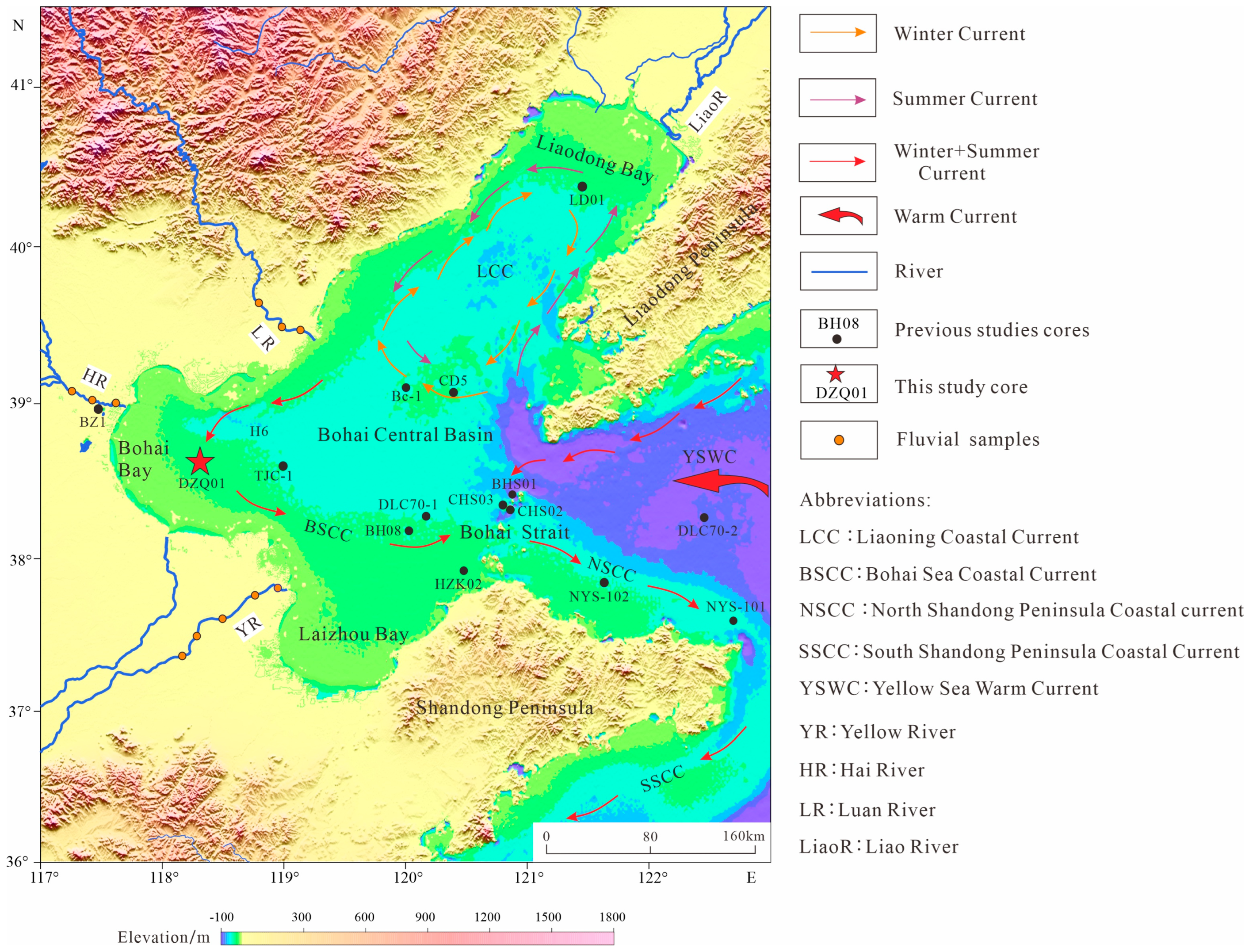
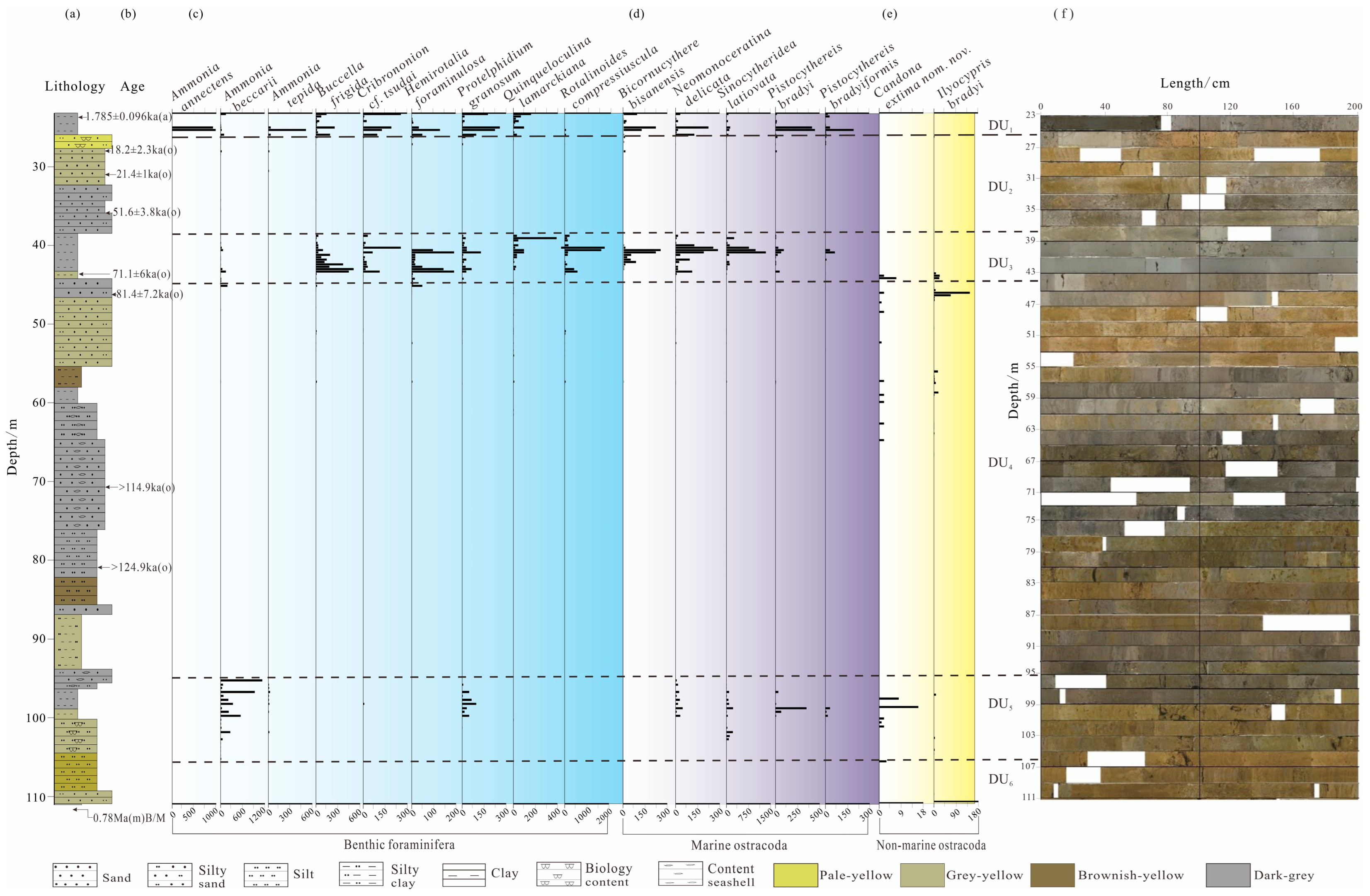

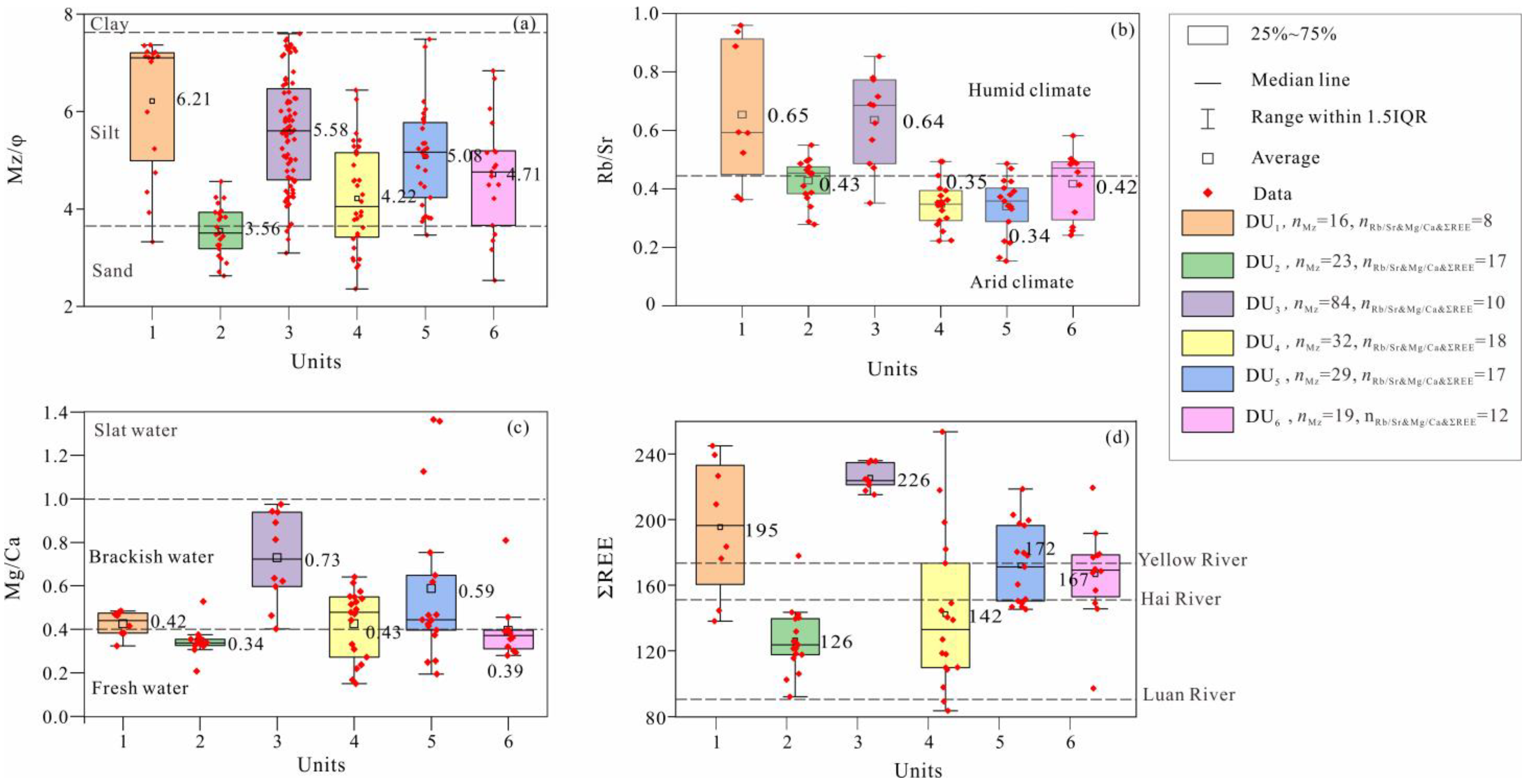

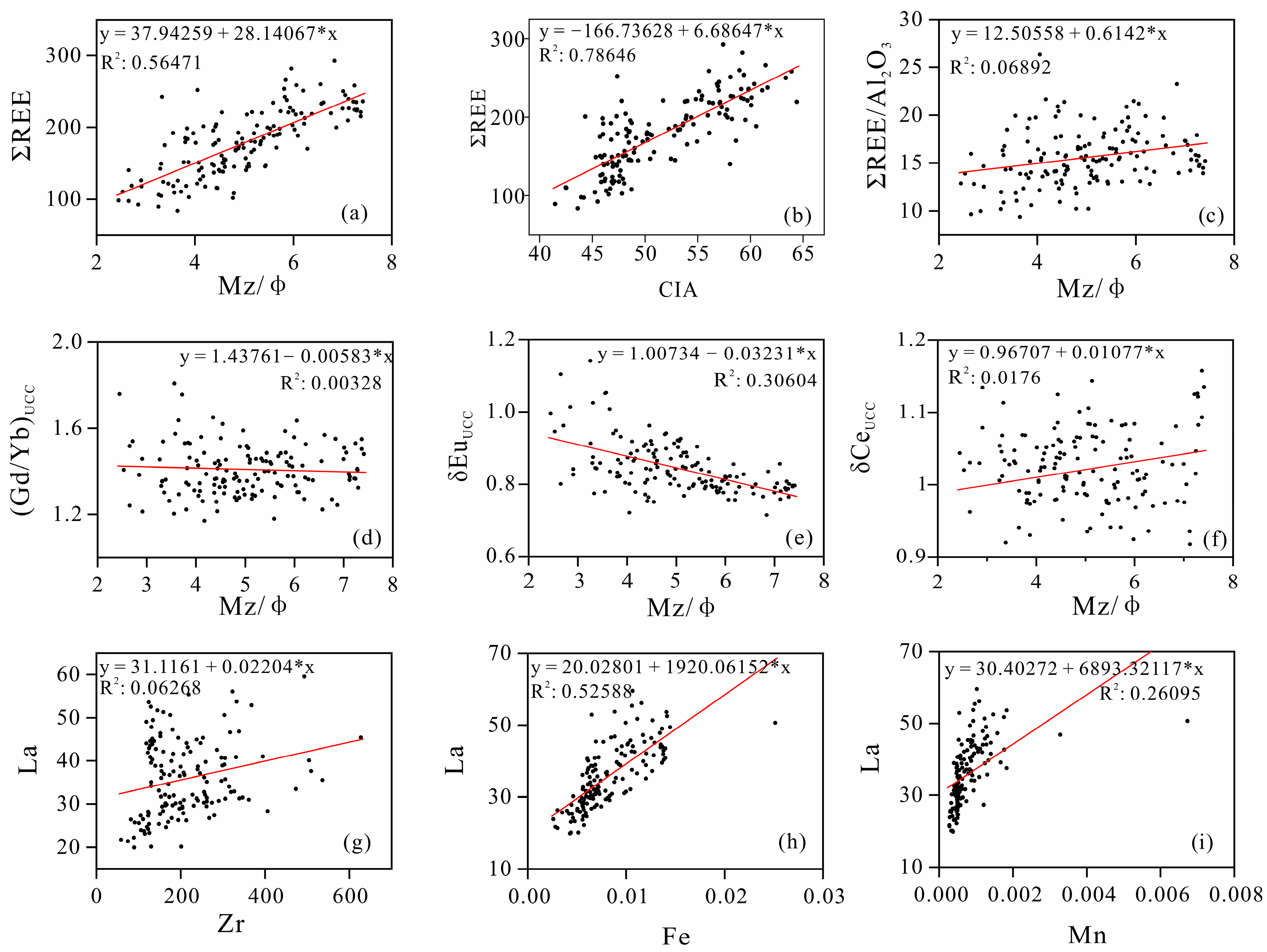

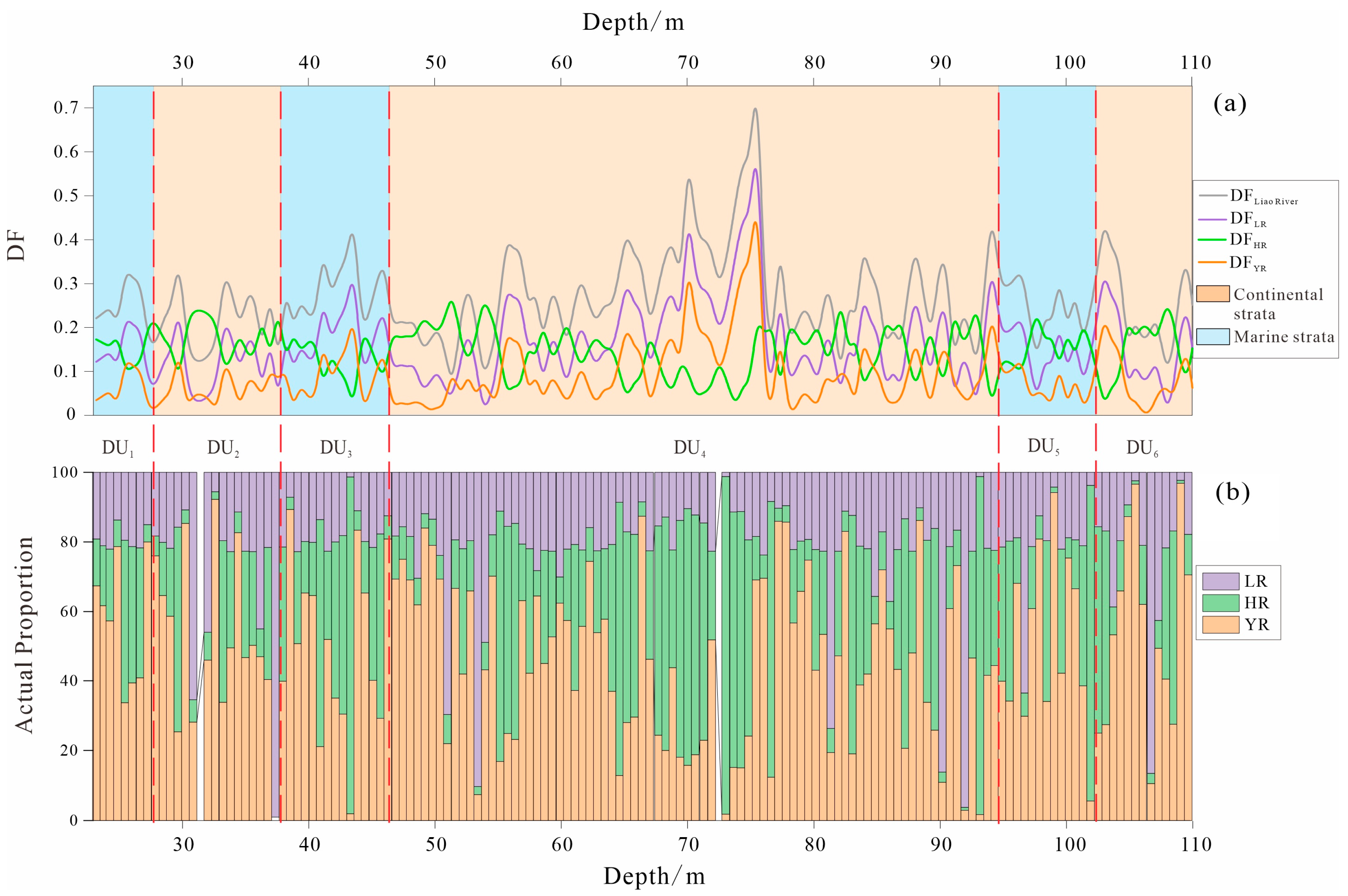
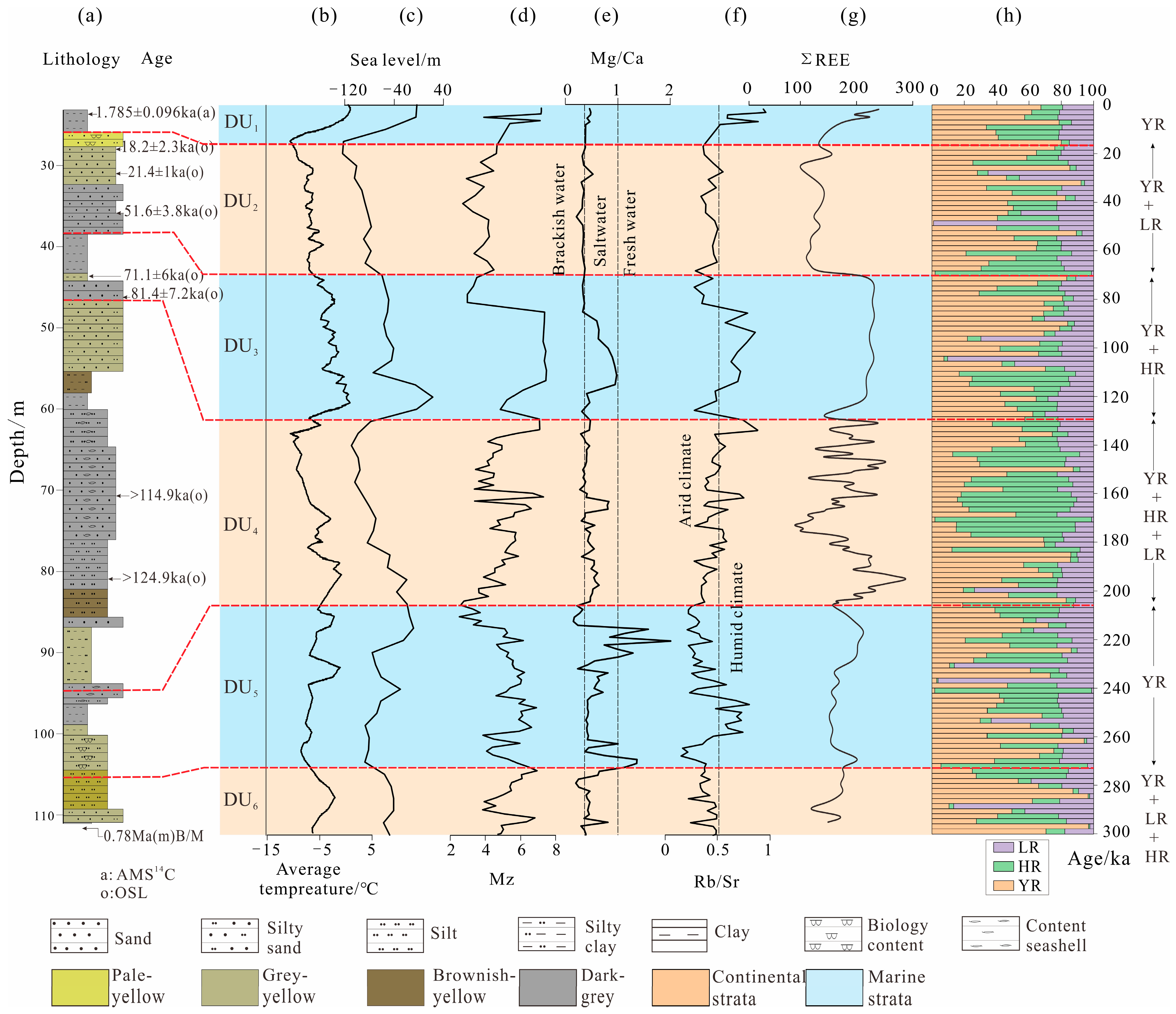
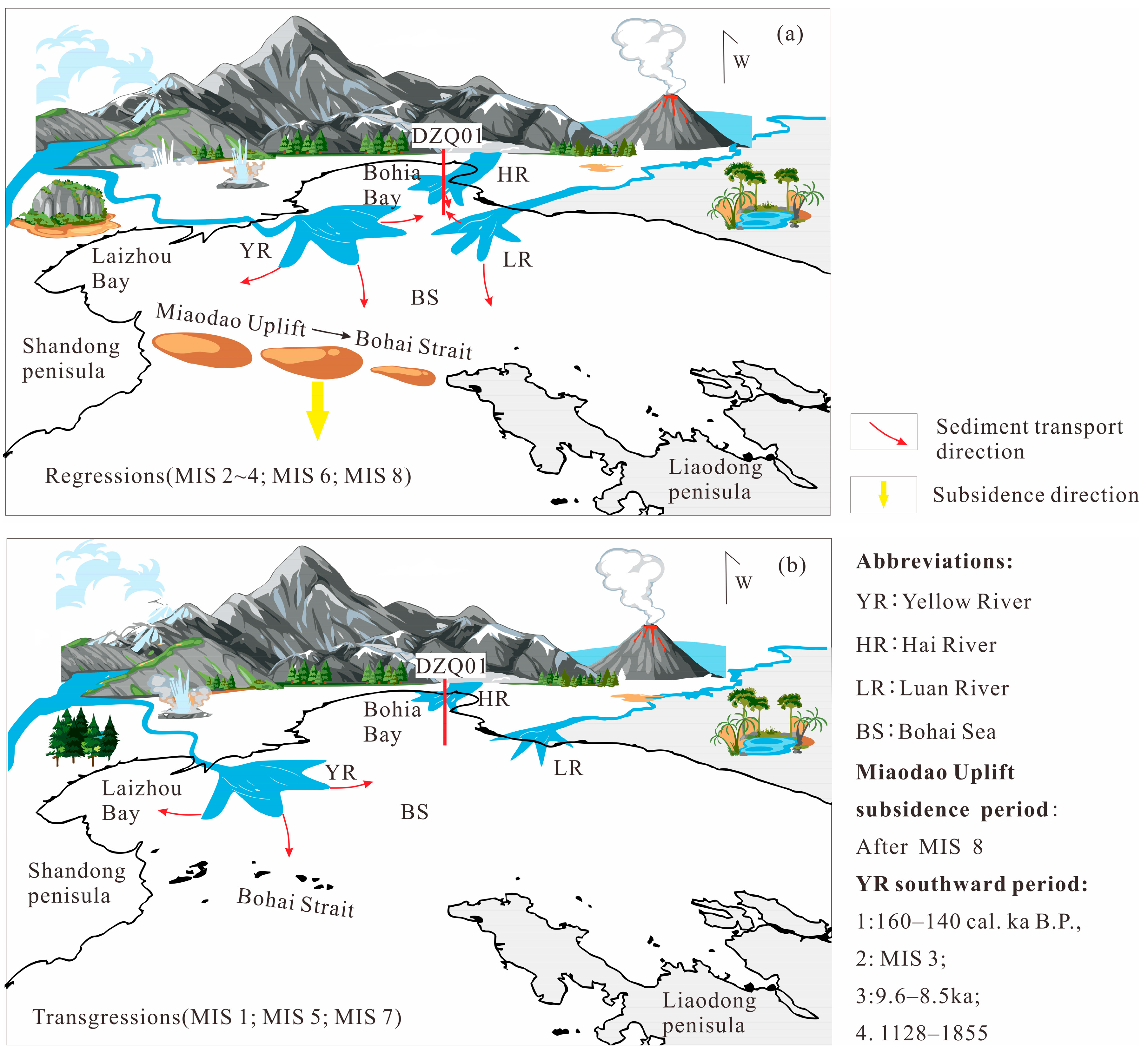
| Statistic | ΣREE | ΣLREE | ΣHREE | ΣLREE/ΣHREE | (La/Yb)UCC | (La/Sm)UCC | (Gd/Yb)UCC | δEuUCC | δCeUCC | References | |
|---|---|---|---|---|---|---|---|---|---|---|---|
| DZQ01 | Average value (N = 145) | 178.78 | 139.36 | 39.42 | 3.95 | 1.27 | 1.26 | 1.41 | 0.85 | 1.02 | This study |
| Distribution range | 83.73~292.86 | 74.26~230.58 | 9.46~68.02 | 2.62~5.61 | 0.93~2.21 | 0.97~1.67 | 1.17~2.02 | 0.71~1.14 | 0.05~1.24 | ||
| YR | Average value (N = 5) | 176.44 | 157.68 | 18.76 | 8.31 | 0.92 | 0.80 | 1.27 | 0.90 | 0.94 | |
| Distribution range | 120.79~262.55 | 107.17~238.39 | 13.62~24.16 | 7.57~9.87 | 0.77~1.17 | 0.68~0.91 | 1.15~1.42 | 0.76~1.03 | 0.75~1.03 | ||
| HR | Average value (N = 3) | 150.49 | 133.02 | 17.47 | 7.66 | 0.75 | 0.69 | 1.18 | 1.02 | 0.95 | |
| Distribution range | 98.15~167.67 | 86.79~148.81 | 11.35~20.36 | 6.99~8.61 | 0.69~0.9 | 0.66~0.76 | 1.1~1.29 | 0.96~1.12 | 0.85~1.05 | ||
| LR | Average value (N = 3) | 93.91 | 83.79 | 10.12 | 8.24 | 0.95 | 0.78 | 1.22 | 1.22 | 0.76 | |
| Distribution range | 78.65~111.23 | 69.19~100.59 | 9.46~10.64 | 7.31~9.45 | 0.91~1.01 | 0.73~0.88 | 1.17~1.24 | 1.11~1.35 | 0.6~1.02 | ||
| Liao river | Average value | 129.08 | 115.06 | 14.02 | 8.21 | 0.93 | 0.88 | 1.11 | 1.02 | 0.83 | [24] |
| World rivers | Average value | 205.00 | 191.50 | 13.50 | 14.19 | 0.94 | 0.96 | 0.83 | 1.19 | 1.04 | [7] |
| BS | Average value (N = 3) | 209.69 | 182.20 | 27.49 | 6.63 | 1.51 | 0.92 | 2.01 | 1.17 | 0.73 | [38] |
| Yellow sea | Average value (N = 6) | 123.01 | 111.59 | 11.42 | 9.77 | 1.11 | 0.95 | 1.51 | 1.07 | 0.99 | |
| East China Sea | Average value (N = 11) | 120.13 | 107.25 | 12.88 | 8.33 | 0.98 | 0.74 | 1.56 | 0.92 | 1.00 | |
| South China Sea | Average value (N = 3) | 166.26 | 152.14 | 14.12 | 10.77 | 1.87 | 1.07 | 2.12 | 1.10 | 0.65 | |
| China shelf sea | Average value (N = 23) | 154.77 | 138.30 | 16.47 | 8.88 | 13.44 | 4.02 | 2.50 | 0.70 | 0.94 |
Disclaimer/Publisher’s Note: The statements, opinions and data contained in all publications are solely those of the individual author(s) and contributor(s) and not of MDPI and/or the editor(s). MDPI and/or the editor(s) disclaim responsibility for any injury to people or property resulting from any ideas, methods, instructions or products referred to in the content. |
© 2025 by the authors. Licensee MDPI, Basel, Switzerland. This article is an open access article distributed under the terms and conditions of the Creative Commons Attribution (CC BY) license (https://creativecommons.org/licenses/by/4.0/).
Share and Cite
Wu, S.; Liu, J.; Feng, Y. Provenance Evolution Since the Middle Pleistocene in the Western Bohai Sea, North China: Integrated Rare Earth Element Geochemistry and Sedimentological Records. J. Mar. Sci. Eng. 2025, 13, 1632. https://doi.org/10.3390/jmse13091632
Wu S, Liu J, Feng Y. Provenance Evolution Since the Middle Pleistocene in the Western Bohai Sea, North China: Integrated Rare Earth Element Geochemistry and Sedimentological Records. Journal of Marine Science and Engineering. 2025; 13(9):1632. https://doi.org/10.3390/jmse13091632
Chicago/Turabian StyleWu, Shuyu, Jun Liu, and Yongcai Feng. 2025. "Provenance Evolution Since the Middle Pleistocene in the Western Bohai Sea, North China: Integrated Rare Earth Element Geochemistry and Sedimentological Records" Journal of Marine Science and Engineering 13, no. 9: 1632. https://doi.org/10.3390/jmse13091632
APA StyleWu, S., Liu, J., & Feng, Y. (2025). Provenance Evolution Since the Middle Pleistocene in the Western Bohai Sea, North China: Integrated Rare Earth Element Geochemistry and Sedimentological Records. Journal of Marine Science and Engineering, 13(9), 1632. https://doi.org/10.3390/jmse13091632






